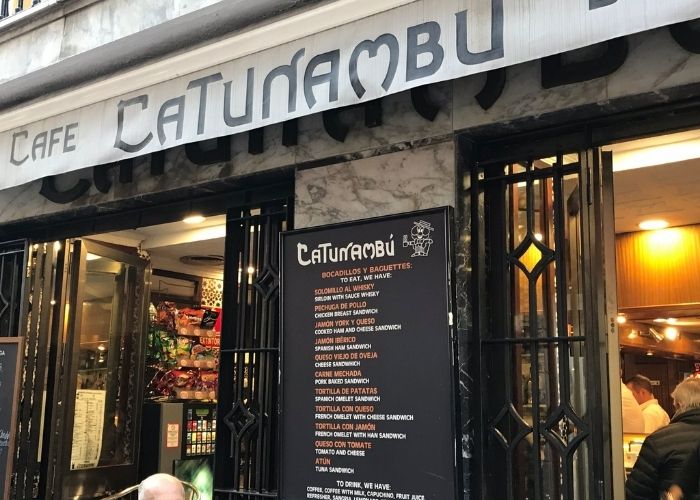Dressed in a black shirt and red apron, he pours a frothy layer of milk onto the dark brown-black liquid in a tiny cup with a concentrated look and very careful movements. This liquid is the fuel for many to start the day. Despite his careful working method, he manages to talk continuously. Rather rattle. And that in unadulterated ‘Andalu‘. We do our best to follow this barista.
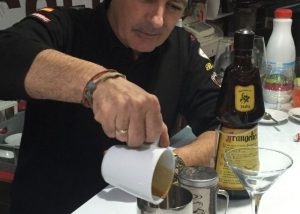
Catunambú
Catunambú is a Spanish family business that, since 1897, has devoted itself with heart and soul to the traditional roasting of the tastiest and high-quality coffee beans from all over the world. This company’s coffees are known for having an intense aroma and exceptional taste. According to Juanma, there is Spanish ‘pasión’ (passion) and ‘alegría’ (joy of life) in the coffee. That passion is well reflected in the way the coffee is promoted worldwide; a flamenco dancer dressed in a blood-red dress (the same red as in the logo) against a jet black background. This image appeals to the imagination, especially in Asia, where flamenco and therefore Andalucia are very popular.
Colombian coffee maker as origin
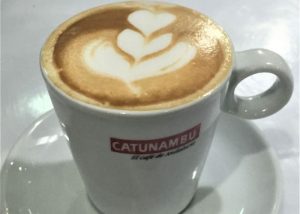
Today, Catunambú is one of the oldest and best-known coffee brands in Spain. It is the only one that is still 100% Spanish-owned. Consumers find the coffee on the shelves of the best department stores. Because Juanma donates coffee at a fair in Seville, the proceeds of which go to a good cause, we combine drinking a cup of coffee with the enthusiastic barista with a visit to the coffee roaster on the outskirts of Seville. There, the high-quality coffee beans from all over the world are selected, traditionally roasted, and blended. For several years, Andalucian coffee has been spreading all over the world. And now, the Spanish passion in a cup is also available in the Netherlands, China, Thailand, the United States, Germany, and France.
Sustainable coffee, tea and cocoa powder
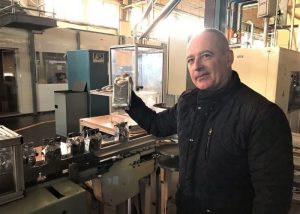
Our barista continuously prepares coffees in record time with fluid movements, while we sip our third cappuccino. He continues, ‘we also promote a healthy and balanced lifestyle. In Andalucia, for example, we sponsor numerous local youth football teams and we regularly organise our ‘Catunambú Cup’.”
Where does coffee come from?
The origin of coffee, Juanma says, is located in Abyssinia (now Ethiopia), in Northeast Africa. Here Shepherd Kaldi was very surprised when one day he saw his flock much more energetic than usual, after they had eaten red seeds from a bush he did not know. Kaldi decided to taste the fruits for himself and, finding that he felt invigorated by them, took some to a nearby monastery. The monks cooked the fruits and tasted the drink. They were surprised by the unpleasant taste and threw the rest of the fruits into the fire. Then, when a wonderful scent rose from the fire as the fruits were being roasted, the monks decided to remove them from the fire and add them to hot water again. As legend has it, this is how the first cup of coffee was born.
The coffee factory
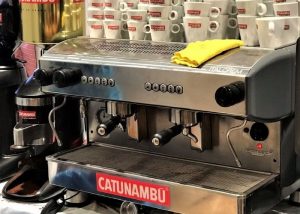
Juanma then leads us through the huge hall where high piles of jute sacks with coffee beans are stacked. The beans differ in colour. One species is light green and the other more brownish. Inscriptions point to the origins of Peru, Colombia, Brazil, Costa Rica, Kenya, Nicaragua, Ecuador, and Asia. Our barista adds that the only place in Europe where coffee is grown is a valley in Gran Canaria. “The coffee that comes from the Valle de Agaete is very exclusive.”
Juanma likes a good filter coffee the most and the best coffee still comes from Ethiopia, where the beans originally come from. “El buencafé debe ser caliente como nuestro sol, negro como el diablo, puro como un ángel y dulce como el amor”. (good coffee should be black as hell, warm like our sun, pure like an angel, and sweet as love) this is how Juanma poetically concludes his story. We wonder later whether he came up with this Catunambú slogan. Or whether Juanma appropriated it out of his fanatical love for ‘his’ coffee.
